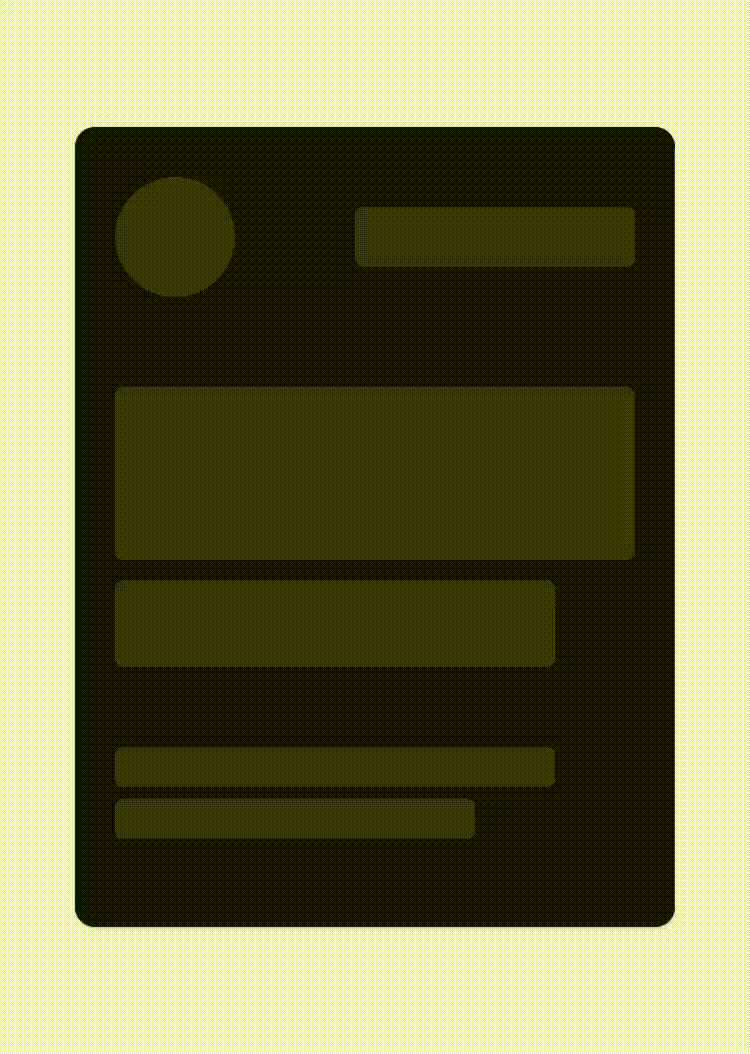alexZajac / React Native Skeleton Content
Programming Languages
Projects that are alternatives of or similar to React Native Skeleton Content
React Native Skeleton Content
If you are not using expo, please head up to this page instead.

React native Skeleton Content, a simple yet fully customizable component made to achieve loading animation in a Skeleton-style. Works in both iOS and Android.
New Features
- The package has been rewritten to Hooks and is using the declarative react-native-reanimated package for animations
- It now supports nested layouts for children bones, see an example on this snack
- It finally supports percentages dimensions for bones, for any type of animation!
Installation
npm install react-native-skeleton-content
Usage
- Import react-native-skeleton-content:
import SkeletonContent from 'react-native-skeleton-content';
- Once you create the SkeletonContent, you have two options:
- Child Layout : The component will figure out the layout of its bones with the dimensions of its direct children.
-
Custom Layout : You provide a prop
layoutto the component specifying the size of the bones (see the Examples section below). Herunder is the example with a custom layout. A key prop for each child is optionnal but highly recommended.
export default function Placeholder() {
return (
<SkeletonContent
containerStyle={{ flex: 1, width: 300 }}
isLoading={false}
layout={[
{ key: 'someId', width: 220, height: 20, marginBottom: 6 },
{ key: 'someOtherId', width: 180, height: 20, marginBottom: 6 }
]}
>
<Text style={styles.normalText}>Your content</Text>
<Text style={styles.bigText}>Other content</Text>
</SkeletonContent>
);
}
- Then simply sync the prop
isLoadingto your state to show/hide the SkeletonContent when the assets/data are available to the user.
export default function Placeholder () {
const [loading, setLoading] = useState(true);
return (
<SkeletonContent
containerStyle={{flex: 1, width: 300}}
isLoading={isLoading}>
{...otherProps}
/>
)
}
Props
| Name | Type | Default | Description |
|---|---|---|---|
| isLoading | bool | required | Shows the Skeleton bones when true |
| layout | array of objects | [] | A custom layout for the Skeleton bones |
| duration | number | 1200 ms | Duration of one cycle of animation |
| containerStyle | object | flex: 1 | The style applied to the View containing the bones |
| easing | Easing | bezier(0.5, 0, 0.25, 1) | Easing of the bones animation |
| animationType | string | "shiver" | The animation to be used for animating the bones (see demos below) |
| animationDirection | string | "horizontalRight" | Used only for shiver animation, describes the direction and end-point (ex: horizontalRight goes on the x-axis from left to right) |
| boneColor | string | "#E1E9EE" | Color of the bones |
| highlightColor | string | "#F2F8FC" | Color of the highlight of the bones |
Note: The Easing type function is the one provided by react-native-reanimated, so if you want to change the default you will have to install it as a dependency.
Examples
See the playground section to experiment : 1 - Changing the direction of the animation (animationDirection prop) :
export default function Placeholder () {
return (
<SkeletonContent
containerStyle={{flex: 1, width: 300}}
animationDirection="horizontalLeft"
isLoading={true}>
...
/>
)
}
2 - Changing the colors and switching to "pulse" animation (boneColor, highlightColor and animationType prop) :
export default function Placeholder () {
return (
<SkeletonContent
containerStyle={{flex: 1, width: 300}}
boneColor="#121212"
highlightColor="#333333"
animationType="pulse"
isLoading={true}>
...
/>
)
}
3 - Customizing the layout of the bones (layout prop) :
export default function Placeholder () {
return (
<SkeletonContent
containerStyle={{flex: 1, width: 300}}
animationDirection="horizontalLeft"
layout={[
// long line
{ width: 220, height: 20, marginBottom: 6 },
// short line
{ width: 180, height: 20, marginBottom: 6 },
...
]}
isLoading={true}>
...
/>
)
}
Playground
You can test out the features and different props easily on Snack. Don't hesitate to take contact if anything is unclear !




